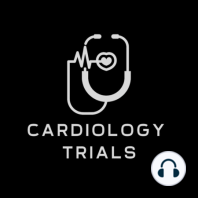11 min listen
Review of the GISSI-2 Trial
ratings:
Length:
10 minutes
Released:
Jan 12, 2024
Format:
Podcast episode
Description
Lancet 1990;336:65-71.Background Large trials up to this point had established the role of thrombolytic therapy and aspirin in patients with acute MI. The next question centered on the different types of thrombolytic agents as well as the merits of adding high dose heparin to aspirin following revascularization. Data from smaller studies showed that alteplase (tPA) had a higher recanalization rate at 90 minutes compared to streptokinase (SK). “Recanalization” is a surrogate endpoint – a person doesn’t necessarily care whether their artery is open or not at 90 minutes, but instead, whether they live or die, and how they live in the aftermath of a heart attack. The GISSI-2 trial sought to test the hypothesis that tPA would reduce the composite hard endpoint of mortality and extensive LV dysfunction compared to streptokinase (SK) and that heparin plus aspirin compared to aspirin alone would do the same.Cardiology Trial’s Substack is a reader-supported publication. To receive new posts and support our work, consider becoming a free or paid subscriber.Patients Patients were eligible who presented with chest pain and ST segment elevations of ≥1 mm in any limb lead of the ECG and/or ≥2 mm in any precordial leads and were admitted to the CCU within 6 hr from the onset of symptoms. Absolute contraindications included: recent or current bleeding, stroke within the previous 6 months, a surgical or invasive procedure or trauma within the previous 2 weeks, uncontrolled hypertension defined as SBP ≥200 mmHg or DBP ≥110 mmHg, or previous treatment with SK within 6 months.Baseline characteristics The number of patients who were admitted to CCUs with acute myocardial infarctions (MI) over the study period was 38,086 and 12,490 (33%) were ultimately enrolled. Reasons for exclusion included: more than 6 hr from onset of symptoms (61%), contraindications to fibrinolysis (15%), unlikely to have acute MI (13%), administrative reasons (5%), ST depressions (4%) and 1% were not reported. Similar to GISSI-1, which also provided information on patients enrolled versus those who were not, women were more likely to be excluded (30% of excluded vs 20% of enrolled) as were patients >70 years of age (41% of excluded vs 22% of enrolled). The death rate of those excluded was higher (11% of excluded vs 9% of enrolled).Approximately 80% of patients enrolled were men under the age of 70. Patients with inferior (34%) and anterior STEMI’s (31%) composed more than half of the cohort. 72% of patients presented within 3 hours of symptom onset and over 95% had Killip scores of II or below with the vast majority being Killip I (78%).Procedures Immediately following randomization half of all patients received either 1.5 MU of SK infused over 1 hour or 100 mg of tPA infused over 3 hours. Since this was a 2x2 factorial design, half of all patients also received 12,500 U of subcutaneous heparin twice daily starting 12 hours after the beginning of the tPA or SK infusion and to be continued until hospital discharge.All patients without specific contraindications were recommended to receive oral aspirin 325 mg/day and 5-10 mg of IV atenolol, even before randomization, as soon as evolving MI was diagnosed.Endpoints The combined primary endpoint consisted of all-cause mortality plus the number of patients who had late (day 4 or later) clinical congestive heart failure, or extensive LV damage (LVEF <35%) in the absence of clinical heart failure.Results 12,490 patients were randomized from 223 CCUs in Italy. Alteplase did not significantly reduced the composite primary endpoint compared to SK overall (RR 1.04; 23.1% vs 22.5%; 95% CI 0.95-1.13) or in any important subgroups based on hours from symptom onset or site and type of infarct. Alteplase did not significantly reduce any of the individual components of the combined endpoint including death (9.0% vs 8.6%). There were no differences in adverse events or post-infarction in-hospital complications between patients receiving alte
Released:
Jan 12, 2024
Format:
Podcast episode
Titles in the series (40)
Review of the ISIS-2 Trial by Cardiology Trials
